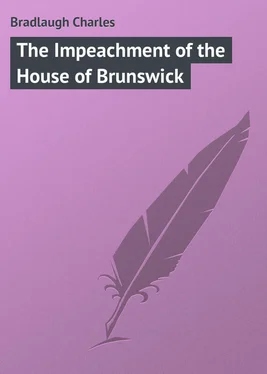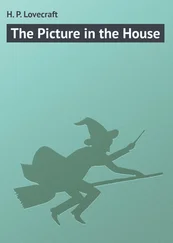Charles Bradlaugh - The Impeachment of the House of Brunswick
Здесь есть возможность читать онлайн «Charles Bradlaugh - The Impeachment of the House of Brunswick» — ознакомительный отрывок электронной книги совершенно бесплатно, а после прочтения отрывка купить полную версию. В некоторых случаях можно слушать аудио, скачать через торрент в формате fb2 и присутствует краткое содержание. Жанр: foreign_prose, на английском языке. Описание произведения, (предисловие) а так же отзывы посетителей доступны на портале библиотеки ЛибКат.
- Название:The Impeachment of the House of Brunswick
- Автор:
- Жанр:
- Год:неизвестен
- ISBN:нет данных
- Рейтинг книги:4 / 5. Голосов: 1
-
Избранное:Добавить в избранное
- Отзывы:
-
Ваша оценка:
- 80
- 1
- 2
- 3
- 4
- 5
The Impeachment of the House of Brunswick: краткое содержание, описание и аннотация
Предлагаем к чтению аннотацию, описание, краткое содержание или предисловие (зависит от того, что написал сам автор книги «The Impeachment of the House of Brunswick»). Если вы не нашли необходимую информацию о книге — напишите в комментариях, мы постараемся отыскать её.
The Impeachment of the House of Brunswick — читать онлайн ознакомительный отрывок
Ниже представлен текст книги, разбитый по страницам. Система сохранения места последней прочитанной страницы, позволяет с удобством читать онлайн бесплатно книгу «The Impeachment of the House of Brunswick», без необходимости каждый раз заново искать на чём Вы остановились. Поставьте закладку, и сможете в любой момент перейти на страницу, на которой закончили чтение.
Интервал:
Закладка:
Of the Duke of Newcastle, Lord Macaulay says: "No man was so unmercifully satirized. But in truth he was himself a satire ready made. All that the art of the satirist does for other men, nature had done for him. Whatever was absurd about him stood out with grotesque prominence from the rest of the character. He was a living, moving, talking caricature. His gait was a shuffling trot, his utterance a rapid stutter; he was always in a hurry; he was never in time; he abounded in fulsome caresses and in hysterical tears. His oratory resembled that of Justice Shallow. It was nonsense, effervescent with animal spirits and impertinence. Of his ignorance many anecdotes remain, some well authenticated, some probably invented at coffee-houses, but all exquisitely characteristic. 'Oh, yes, yes, to be sure! Annapolis must be defended; troops must be sent to Annapolis. Pray, where is Annapolis?' 'Cape Breton an island! Wonderful! show it me in the map. So it is, sure enough. My dear sir, you always bring us good news. I must go and tell the King that Cape Breton is an island.' And this man was, during near thirty years, Secretary of State, and during near ten years First Lord of the Treasury! His large fortune, his strong hereditary connection, his great Parliamentary interest, will not alone explain this extraordinary fact. His success is a signal instance of what may be effected by a man who devotes his whole heart and soul without reserve to one object. He was eaten up by ambition. His love of influence and authority resembled the avarice of the old usurer in the 'Fortunes of Nigel.' It was so intense a passion that it supplied the place of talents, that it inspired even fatuity with cunning. 'Have no money dealings with my father,' says Martha to Lord Glenvarloch, 'for, dotard as he is, he will make an ass of you.' It was as dangerous to have any political connection with Newcastle as to buy and sell with old Trapbois. He was greedy after power with a greediness all his own. He was jealous of all colleagues, and even of his own brother. Under the disguise of levity, he was false beyond all example of political falsehood. All the able men of his time ridiculed him as a dunce, a driveller, a child who never knew his own mind for an hour together; and he overreached them all round."
In 1742, under the opposition of Pulteney, the Tories called upon Paxton, the Solicitor to the Treasury, and Scrope, the Secretary to the Treasury, to account for the specific sum of £1,147,211, which it was proved they had received from the minister. No account was ever furnished. George Vaughan, a confidant of Sir Robert Walpole, was examined before the Commons as to a practice charged upon that minister, of obliging the possessor of a place or office to pay a certain sum out of the profits of it to some person or persons recommended by the minister. Vaughan, who does not appear to have ventured any direct denial, managed to avoid giving a categorical reply, and to get excused from answering on the ground that he might criminate himself. Agitation was commenced for the revival of Triennial Parliaments, for the renewal of the clause of the Act of Settlement, by which pensioners and placemen were excluded from the House of Commons, and for the abolition of standing armies in time of peace. The Whigs, however, successfully crushed out the whole of this agitation. Strong language was heard in the House of Commons, where Sir James Dashwood said that "it was no wonder that the people were then unwilling to support the Government, when a weak, narrow-minded prince occupied the throne."
A very amusing squib appeared in 1742, when Sir Robert Walpole's power was giving way, partly under the bold attacks of the Tories, led by Cotton and Shippen; partly before the malcontent Whigs under the guidance of Carteret and Pulteney; partly before the rising power of the young England party led by William Pitt; and somewhat from the jealousy, if not treachery, of his colleague, the Duke of Newcastle. The squib pictures the King's embarrassment and anger at being forced to dismiss Walpole, and to Carteret, whom he has charged to form a ministry: —
"Quoth the King:
'My good lord, perhaps you've been told
That I used to abuse you a little of old,
But now bring whom you will, and eke turn away,
Let but me and my money at Walmoden stay."
Lord Carteret, explaining to the King whom he shall keep of the old ministry, includes the Duke of Newcastle: —
"Though Newcastle's false, as he's silly I know,
By betraying old Robin to me long ago,
As well as all those who employed him before,
Yet I leave him in place, but I leave him no power.
"For granting his heart is as black as his hat,
With no more truth in this than there's sense beneath that,
Yet, as he's a coward, he'll shake when I frown;
You called him a rascal, I'll use him like one.
"For your foreign affairs, howe'er they turn out,
At least I'll take care you shall make a great rout;
Then cock your great hat, strut, bounce, and look bluff,
For, though kick'd and cuff'd here, you shall there kick and cuff
"That Walpole did nothing they all used to say,
So I'll do enough, but I'll make the dogs pay;
Great-fleets I'll provide, and great armies engage,
Whate'er debts we make, or whate'er wars we wage!
"With cordials like these the monarch's new guest
Reviv'd his sunk spirits, and gladdened his breast;
Till in rapture he cried, 'My dear Lord, you shall do
Whatever you will – give me troops to review.'"
In 1743, King George II. actually tried to engage this country, by a private agreement, to pay £300,000 a year to the Queen of Hungary, "as long as war should continue, or the necessity of her affairs should require." #The King, being in Hanover, sent over the treaty to England, with a warrant directing the Lords Justices to "ratify and confirm it," which, however, they refused to do. On hearing that the Lord Chancellor refused to sanction the arrangement, King George H. threatened, through Earl Granvillie, to affix the Great Seal with his own hand. Ultimately the £300,000 per annum was agreed to be paid so long as the war lasted, but this sum was in more than one instance exceeded.
Although George II. had induced the country to vote such large sums to Maria Therese, the Empress-Queen, he nevertheless abandoned her in a most cowardly manner when he thought his Hanoverian dominions in danger, and actually treated with France without the knowledge or consent of his ministry. A rhyming squib, in which the King is termed the "Balancing Captain," from which we present the following extracts, will serve to show the feeling widely manifested in England at that time: —
"I'll tell you a story as strange as 'tis new,
Which all who're concerned will allow to be true,
Of a Balancing Captain, well known hereabouts,
Returned home (God save him) a mere king of clouts.
"This Captain he takes in a gold ballasted ship,
Each summer to terra damnosa a trip,
For which he begs, borrows, scrapes all he can get,
And runs his poor owners most vilely in debt.
"The last time he set out for this blessed place,
He met them, and told them a most piteous case,
Of a sister of his, who, though bred up at court,
Was ready to perish for want of support.
"This Hung'ry sister he then did pretend,
Would be to his owners a notable friend,
If they would at that critical juncture supply her;
They did – but, alas! all the fat's in the fire!"
The ballad then suggests that the King, having got all the money possible, made a peace with the enemies of the Queen of Hungary, described in the ballad as the sister: —
Читать дальшеИнтервал:
Закладка:
Похожие книги на «The Impeachment of the House of Brunswick»
Представляем Вашему вниманию похожие книги на «The Impeachment of the House of Brunswick» списком для выбора. Мы отобрали схожую по названию и смыслу литературу в надежде предоставить читателям больше вариантов отыскать новые, интересные, ещё непрочитанные произведения.
Обсуждение, отзывы о книге «The Impeachment of the House of Brunswick» и просто собственные мнения читателей. Оставьте ваши комментарии, напишите, что Вы думаете о произведении, его смысле или главных героях. Укажите что конкретно понравилось, а что нет, и почему Вы так считаете.











